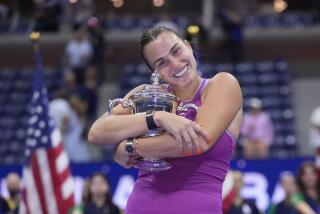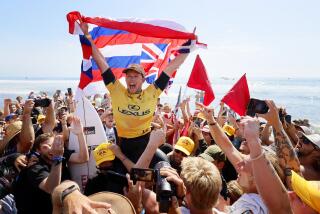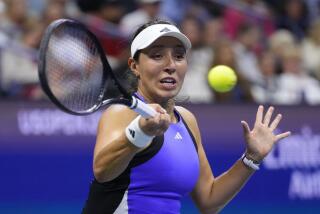Clijsters refuses to be simply an appetizer
- Share via
FROM NEW YORK — You had your bagel for breakfast. Kim Clijsters and Venus Williams had theirs in a late lunch Sunday afternoon at the U.S. Open tennis tournament.
Once they digested that, it was time for real food, for something sumptuous.
Not only did Clijsters, the comeback kid who is now a 26-year-old mom, upset third-seeded Williams, 29. She did so in one of the stranger and more dramatic women’s matches in U.S. Open history.
The strange part was the score.
Clijsters won the first set in 27 minutes at love. Williams returned the favor in 23 minutes. Bagel begot bagel.
Then Clijsters broke the bigger-serving Williams in the third game of the final set and battled, scrapped and served it out at 6-4 to complete the stunner in a final set that took 52 minutes, or eight minutes less than the total of the first two.
Yes, that’s right, 6-0, 0-6, 6-4.
That happens at your tennis club and it creates chatter. That doesn’t happen when two of the better players in the history of women’s tennis hook up.
But it did, and Clijsters’ reaction when interviewed on the court immediately afterward was spot on.
“It was such a weird match,” she said. “After the second set, I thought, let’s just start over and fight for each point.”
A tennis match had become a “Rocky” movie. Apollo Creed connects with an uppercut and dominates the first five rounds. Then Rocky Balboa catches him with a left hook and wins the next five. Back and forth, setting up the grand finale. Yo, Adrian.
Clijsters got the crucial third-set break when, incredibly, Williams double-faulted on break point. That was in the 1-1 game that she had begun with 122- and 118-mph service bombs that overwhelmed Clijsters.
But the match was nowhere near over.
The baseline shots they sent at each other were laser beams -- deep, accurate, penetrating bombs hit successfully only by those who are near-perfect in footwork, fitness and technique.
Williams started the 1-3 game with another double fault, but then held with a huge forehand on game point. She tried to get to break point in the next game by rushing the net, but she netted a backhand volley and Clijsters got a good angle on a 101-mph first serve on game point that Williams hit long. Clijsters led, 4-2.
Williams held for 4-3 with a 113-mph service winner and then got it to 30-all on Clijsters’ serve. But Clijsters, who admits to getting nervous and faltering at times like this, won another baseline battle when a backhand by Williams flew long.
Clijsters got to within two points of the match on Williams’ serve at 3-5, but Williams heated up the serve again. Clijsters netted Williams’ 116-mph offer at deuce and then returned the next big serve feebly enough for Williams to hit a backhand winner.
Now the moment had come.
Kim Clijsters, U.S. Open champion in 2005 and former No. 1 player, was serving for the match. She would know whether she was back or she wasn’t. This was not just anybody she was facing. This was Venus Williams, U.S. Open winner in 2000 and 2001, plus five Wimbledons, and also a former No. 1 player.
Clijsters had been gone since she retired in May 2007. On July 13, 2007, she married an American basketball player, Brian Lynch, and they had a daughter the next February.
She says now that she does not regret using the word “retire” when she left, says that beautiful things have happened because of that decision and says that she never even thought about coming back until she was asked to play in, and trained for, an exhibition at Wimbledon in May this year that dedicated the new roof.
“Never, ever did I doubt it [the retirement decision],” she said Sunday, “Or did I think about it.”
She played in tournaments in Cincinnati and Toronto last month, and here she was, in short order, back on the big stage.
The packed crowd in 23,763-seat Arthur Ashe Stadium knew the story and understood the significance. Clijsters toed the service line, and they stood and cheered.
This was the kind of moment for which they shell out $500 for a ticket, the kind that keeps them coming back to this annual New York melodrama. Williams is an American player, Clijsters is Belgian. But this time, the story seemed more compelling than the nationalism.
Williams did what most expected she would, pounding away and getting to 15-40 for two break points. It was here that the old Clijsters, as good as she was, often fell short.
“My arm felt like it weighed 50 pounds or more,” she said. “But I just told myself, look, don’t give it away like that.”
She hit a screaming forehand cross-court winner for 30-40, then stayed with Williams in yet another classic rally: deep shots, crisp angles, every stroke demanding every ounce of focus and bringing the spectators inching further forward in their seats. Williams blinked first, catching the net on a backhand.
Then she netted another one and suddenly, after 1 hour 41 minutes of weirdness and wonder, Clijsters had it on her racket at match point. Not a big server, she found the deep backhand corner at 101 mph and Williams could only lunge and tick it. Clijsters stared for a moment, then smiled widely, walked toward the net and put her face in her hands, as a few tears slipped out.
Soon, she was on the microphone, saying how nice it was to know she has a daughter waiting for her “who doesn’t care if I win or lose” and telling the crowd, “Thank you, guys, for your support.”
It was a fitting love fest, celebrating the eggs Benedict that came after the two slices of dry toast.
--
More to Read
Go beyond the scoreboard
Get the latest on L.A.'s teams in the daily Sports Report newsletter.
You may occasionally receive promotional content from the Los Angeles Times.











